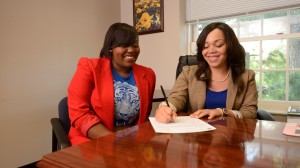 This is the first in a series on the Division of Student Affairs at Ole Miss, which was reorganized July 1 to include four branches: the University Police Department, Wellness and Student Success, Enrollment Management and the Office of the Dean of Students.
This is the first in a series on the Division of Student Affairs at Ole Miss, which was reorganized July 1 to include four branches: the University Police Department, Wellness and Student Success, Enrollment Management and the Office of the Dean of Students.
Maintaining and improving student retention at UM is a primary focus of the newly created Wellness and Student Success branch of the Division of Student Affairs.
Preliminary enrollment numbers released on Sept. 9 indicate that UM’s retention among freshmen is 85.5 percent, up nearly five percent from last year.
Under the leadership of Leslie Banahan, assistant vice chancellor for student affairs, Wellness and Student Success comprises six departments and/or centers and aims to enhance retention by benefiting the “whole student” at Ole Miss — from their physical and emotional well-being to their pre-and post-graduation success.
“The departments were there, but they weren’t necessarily reporting to Leslie Banahan,” said Brandi Hephner LaBanc, UM vice chancellor for student affairs. “Now, we meet division-wide every month. We also have ‘Community of Practice’ meetings so that the people who are working in a similar vein have the chance to sit down and talk at a more meaningful level. It’s not just announcements.”
Strong partnerships with academic leaders and faculty have also played a large role in the student retention outcomes, Hephner LaBanc said.
Branch Structure
Two of the six departments within Wellness and Student Success are new to Student Affairs this year. Student Disability Services and the Center for Student Success and First-Year Experience joined the division in July. Other units within the branch include the Career Center, University Counseling Center, University Health Services and the Department of Campus Recreation.
“Collaboration is going to be key to really help students,” Banahan said. “I think a common goal that we have is to continue to increase our retention rate, hoping that it will then result in an increase in our four-year and six-year graduation rates.”
Previously, Student Disability Services reported to the Equal Opportunity and Regulatory Compliance Office.
Student Affairs created the Center for Student Success and First-Year Experience by combining the Academic Advising Center (which was not a part of the division) and UM’s First-Year Experience program. Establishing a first-year experience office was a strategy outlined in the UM 2020 Strategic Plan.
“The center focuses on all of the things we do in that first year to create in our students a sense of belonging and a sense of place,” Banahan said. “When you look at student success and retention, the first year is critical. For many, many years, the functions of that experience were handled by a number of units. We thought it would be more effective to put all those functions in one place.”
The First-Year Experience program encompasses multiple components including EDHE 105 — a seminar for freshmen — Welcome Week, Freshman Convocation and Rebel Run. The Center for Student Success and First-Year Experience also includes Veterans and Military Services, which provides support to veterans, service members and dependents in a variety of areas while they are earning a degree at UM.
Tracking Attendance and Registration
Representatives from each area of Wellness and Student Success meet regularly to develop goals to enhance retention rates. A number of processes are already in place to aid students such as the “Freshman Attendance Based Initiative,” in which faculty members are asked to report any freshman who has missed three or more classes so that Student Affairs can make contact with that student.
UM employees also look at students who have not yet preregistered for an upcoming semester and reach out to find out whether or not the reason can be resolved.
“We’ve done a number of things to be really intentional about helping students persist,” Banahan said. “Part of that is reaching out through personal touches with students to see what’s going on with them.”